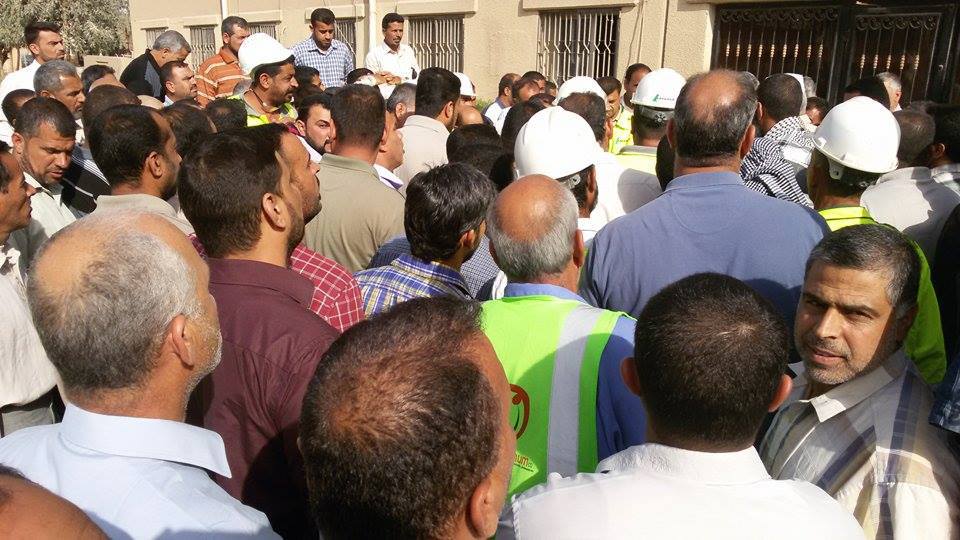
May 4, 2015
Some 350 workers at the Karbala cement plant signed a petition in April requesting representation in negotiations with management after management refused a similar request by a group of workers in February. The workers signed the petition after months of outreach by their co-workers to educate them on their rights.
Although Iraq law prohibits the workers from establishing a union because it is a public-sector factory, the plant receives International Finance Corp. (IFC) loans and IFC labor standards require respect for freedom of association. Also in April, cement workers staged a rally to urge management to meet with a committee of workers to discuss improving safety and health conditions and other key issues.
Workers at the plant, owned by Iraqi government but operated by a private company, say some have been unfairly penalized for asking for better wages and a safer work environment. One worker was transferred and another is being investigated, the workers say. The General Federation of Workers’ Unions in Iraq (GFWUI) sent a letter of support to the workers. “Your struggle is the struggle of all workers,” GFWUI wrote. (GFWUI’s letter in English and Arabic.)
Iraqi workers elsewhere are successfully improving working conditions at IFC-funded workplaces, using skills gained through Solidarity Center training programs, and are documenting violations and negotiating with management to improve working conditions.
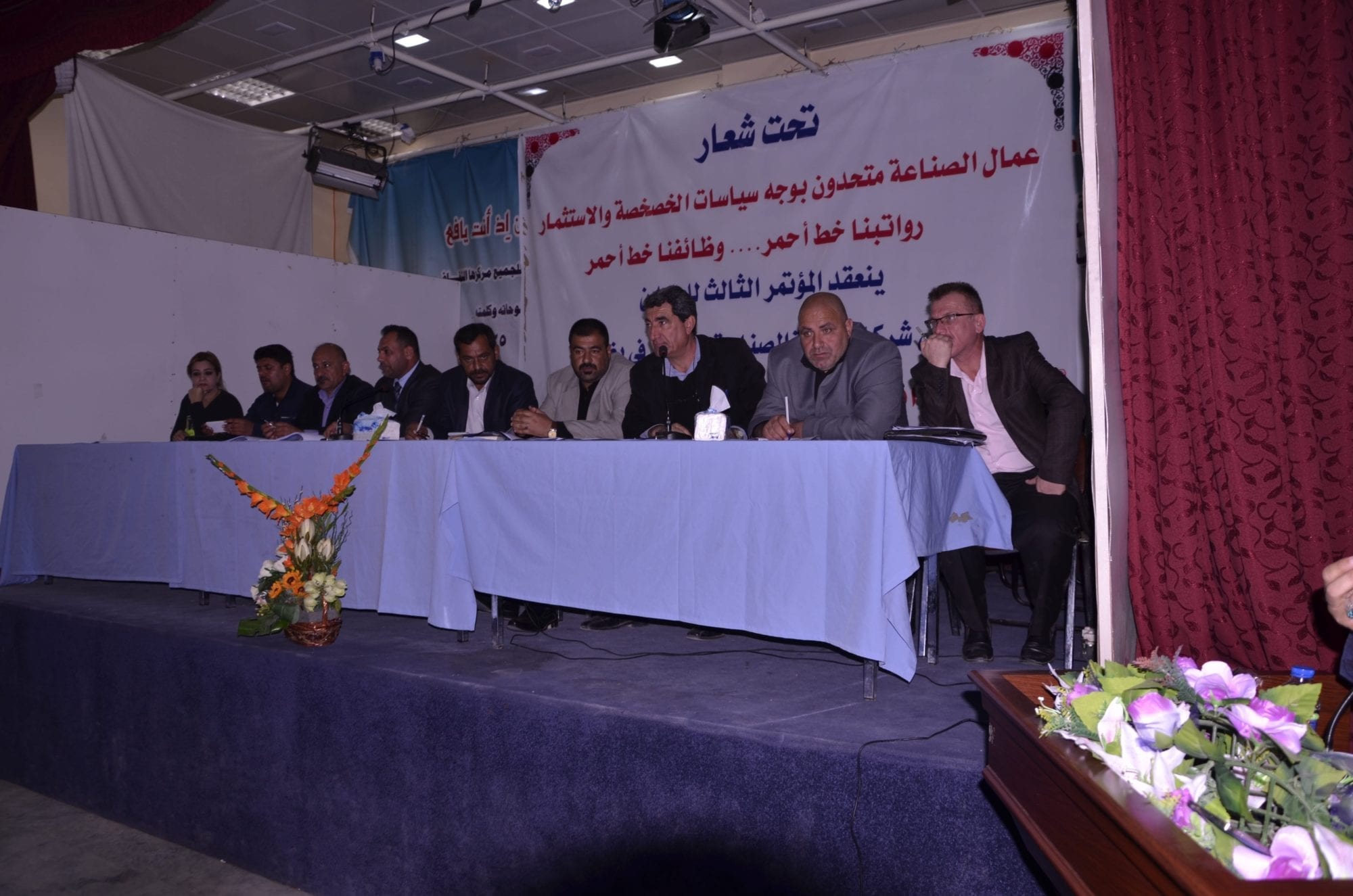
Mar 18, 2015
Tens of thousands of workers in self-financed companies under Iraq’s Ministry of Industry who have not been paid for months are renewing their push for a long-term solution to the crisis, and many are looking to form unions.
Last fall, Iraq workers staged a series of protests to demand their wages. In February, some received one month’s pay, but the government declined to pass a budget that includes stable funding for workers in the companies.
Seeking a long-term solution, many workers are organizing and mobilizing in Baghdad, Bablyon, Wassit, Dewanya and Basra, with some starting to form unions, even though public-sector unions are illegal in Iraq, where the labor law of the Saddam Hussein regime is still on the books.
Supporting their unionization efforts are the General Federation of Iraqi Trade Unions (GFITU), Federation of Worker Councils and Unions in Iraq (FWCUI), General Federation of Workers and Unions in Iraq (GFWUI) and Iraqi Federation of Oil Unions (IFOU).
In a letter of solidarity to Iraq workers, Solidarity Center Executive Director Shawna Bader-Blau noted that Iraq is a member state of the International Labor Organization and thus obligated to adhere to Convention 87, which ensures freedom of association. (Arabic version)
“Collective action is the most effective means workers have to fight back and win,” wrote Bader-Blau.
At a recent conference hosted by FWCUI, workers agreed to several steps to meet short- and long-term economic challenges, including mobilizing mass demonstrations across Iraq to protest the proposed restructuring of government-owned companies, in which hundreds of thousands of workers likely will lose their jobs.
Iraqi workers have won international support for their struggle. In a letter to Iraq Prime Minister Haider al-Abadi, U.S. Labor Against the War, a coalition of 165 labor organizations in the United States, urged the government to assist self-financing companies to get loans and other economic support to enable them to pay employees.
“Iraq’s social stability and economic progress require that the standard of living and economic welfare of all its people be protected and improved,” the letter said.
In addition, the International Trade Union Confederation sent a letter of support, and USLAW sent a letter of support to Iraqi workers.
Click here for the English version of the AFL-CIO letter to al-Abadi and here for the Arabic.
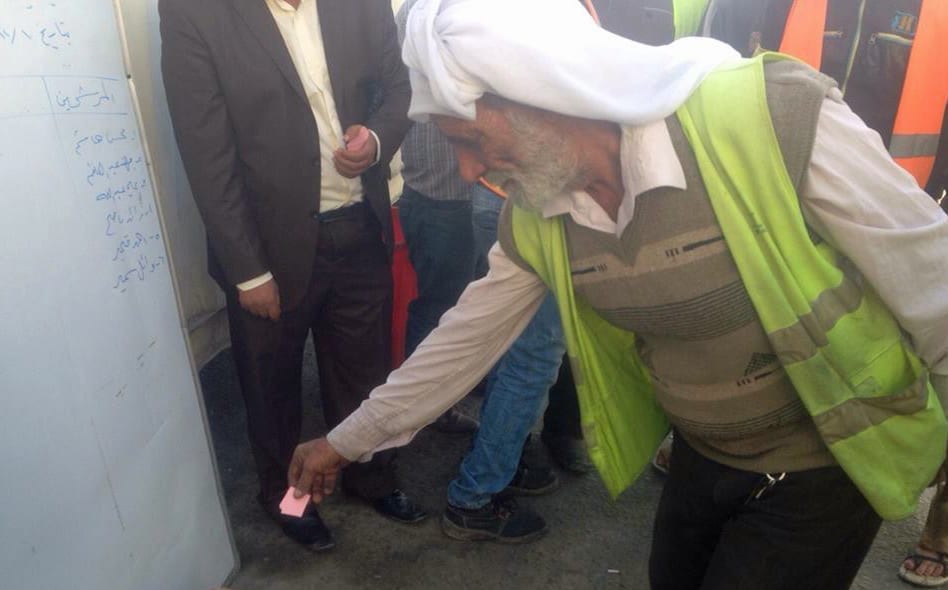
Nov 25, 2014
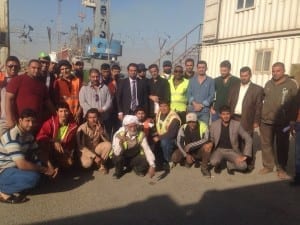 Transport workers at Gulftainer in the Iraqi port of Om Qasr port formed a union committee in November following a three-year organizing effort that involved raising awareness among workers about their rights on the job.
Transport workers at Gulftainer in the Iraqi port of Om Qasr port formed a union committee in November following a three-year organizing effort that involved raising awareness among workers about their rights on the job.
Recognizing they would be better able to negotiate for improved wages and working conditions if they were part of a union, some 119 workers have elected three members to a labor committee that will oversee union elections. The union would be an affiliate of the General Federation of Iraqi Trade Unions (GFITU).
The decision to hold elections signifies a key turning point for Iraqi unions, which generally have waited for management approval to form union committees but now recognize that the freedom to form unions is guaranteed by national and international law. Workers at Gulftainer talked with workers outside the workplace, and also reached out to night shift workers. They held an awareness workshop in Basra and an election preparatory meeting, where they discussed the mechanisms of implementing elections, and the participation of night shift workers in elections.
The newly-elected chairman of the union committee and two other workers at Gulftainer previously took part in a Solidarity Center workshop centered on developing organizing skills among worker representatives at companies funded by International Finance Corporation (IFC) loans.
The Solidarity Center is working with Iraqi trade unions to promote international labor standards at worksites, especially those where companies receive IFC loans, by using the performance standard of IFC institutions to protect worker rights. Iraq’s labor code, created under Saddam Hussein, contains significant gaps in areas of discrimination, forced labor and the right to collective bargaining.
Iraqi unions elsewhere are improving working conditions at IFC-funded workplaces, following Solidarity Center training programs, and are documenting violations and negotiating with management to improve working conditions.
For example, at Erbil Rotana Hotel and at Bazian and Tasluja cement factories in Sulimanyya, workers who took part in the trainings sharpened their organizing skills and went on to negotiate improved work contracts so that workers now receive overtime pay, in accordance with Iraqi labor
Nov 17, 2014
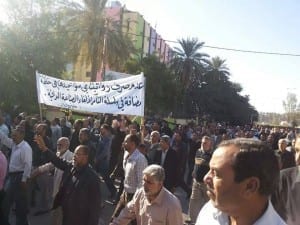
Carrying signs protesting unpaid wages, Iraqi textile workers were among workers from several industries demanding back pay. Credit: Ali Rakeb
The Iraqi government’s offer of partial payment to workers in several industries who have not received salaries for months “is unjust” and should be amended to include all unpaid back pay, says the General Federation of Iraq Trade Unions (GFITU).
The Iraq Council of Ministers last week announced it would pay one month’s wages to workers at plants and factories affiliated with the Ministry of Industry. The companies, which are required to generate sufficient operating revenue to pay 40 percent of workers’ salaries, have repeatedly been unable to do so, and the Ministry of Industry has previously paid workers’ salaries when the companies run out of funds.
The Council of Ministers took the action after thousands of workers in Iraq’s leather, textile and vegetable oil industries protested unpaid wages this month in a series of rallies, most recently in Babylon, where hundreds of workers packed the streets leading to the factory.
Ala’a Sabri, general manager of the association of textile industries in Babylon, said, “the protestors stopped work because they have not been paid since August.”
When vegetable cooking oil company workers in Missan, who also have not been paid since August, took to the streets, they were backed by local government officials who asked the government to pay the workers and renovate Missan’s cooking oil factory, which employs 630 workers.
Clothing company employees in Najaf, who produce men’s suits, pants, jackets, gown’s (dishdasha) and military uniforms, and textile workers in Diwanyya and at the Kut textile factory, also rallied for unpaid wages.
“We are protesting today to request the officials resolve these issues,” Hayder Abdul Amir, one of the protesting employees at Kut, told Al Mada press. “We will continue until they comply with our demands.”
Earlier this month, leather workers, who have not been paid for two months, marched in a large demonstration at two leather companies in Karradha, in central Baghdad. The rally followed one in September, when leather workers protested unpaid wages from July and August.
In an action in support of workers, GFITU members rallied at the Ministry of Interior to demand the government formulate clear policies that guarantee the rights of workers in Iraq’s industrial sector by ensuring workers are paid on time. GFITU also called on the government to take steps to address ongoing factory closures that have put many workers out of a job.
GFITU presented a memo addressed to the Prime Minister Hayder Al Abadi that states: “A large percentage of Iraq’s population, represented by 350,000 employees of the Ministry of Interior and their families, are suffering from hardship and serious neglect.”
The memo listed several demands, including timely wage payment; government transparency when awarding textile and other industry contracts; and creation of a joint government council to address obstacles companies face in staying solvent.
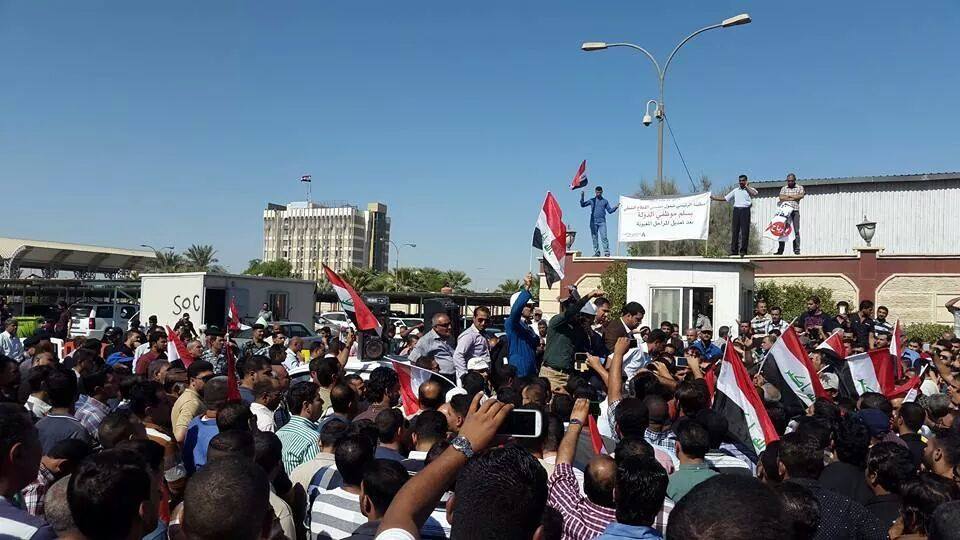
Nov 7, 2014
Some 2,000 workers recently took part in a rally in Basra organized by the Southern Oil Workers Committee, after the government refused to negotiate over issues such as jobs for unemployed workers, skills training and higher pay for hazardous work.
In August 2013, the government excluded workers in the state-run oil sector from receiving wage and benefit increases granted to other public employees. Public-sector wage increases ranged from 5 percent to 114 percent.
Workers delayed the action because of the country’s ongoing instability. Meanwhile, the committee’s negotiation team traveled to Baghdad to meet with government officials at the Ministry of Oil. After negotiations stalled, workers waged a mass rally.
“We are determined to achieve our rights and find no other way to be heard than peaceful demonstrations and sit-in actions,” the Southern Oil Committee said in a statement.
Read the full list of oil workers’ demands in English and Arabic.






